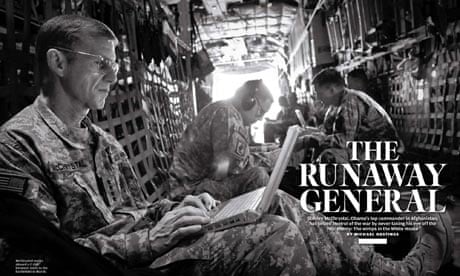The journalist whose article in Rolling Stone magazine led to the sacking of General Stanley McChrystal has been barred from being embedded with US troops next month. The Pentagon said Michael Hastings could not be trusted to abide by its reporting rules.
The journalist, who remained embedded as his article, the Runaway General, was published in June, says he was initially given permission to rejoin US troops fighting in Afghanistan next month.
Writing on Twitter, Hastings says he has now been "disapproved". But the Pentagon suggested the assignment had not been approved in the first place. David Lapan, a spokesman for the US defence department, said Hastings's request to be embedded had been denied.
"There is no right to embed," Lapan said. "It is a choice made between units and individual reporters, and a key element of an embed is having trust that the individuals are going to abide by the ground rules. So in that instance, the command in Afghanistan decided there wasn't the trust requisite and denied this request."
Hastings's behind-the-scenes account of the Afghanistan war caused embarrassment to the White House when the article quoted McChrystal and his aides criticising and mocking the Obama administration. The general was subsequently recalled to Washington and sacked from his post as commander of US and Nato coalition forces in Afghanistan.
News of the rejected request came as the Pentagon continued an internal investigation into the article. Hastings is refusing to participate in the inquiry.
Gordon Heddell, the army inspector general heading the inquiry which began shortly after the article was published, has interviewed the aides involved, according to the Associated Press. He is now considering whether officers were insubordinate and how far up the chain of command the responsibility for decisions involving the Hastings interviews extended, officials said.
Hastings is a freelance reporter currently working on a story about helicopters in Afghanistan, but he also has signed a book deal about the McChrystal story.
The decision to reject him from being embedded has echoes of another incident that occurred during Barack Obama's election campaign, when a critical reporter was denied a press place on a plane trip.
In July 2008, Obama's aides were reported to be angered by an infamous New Yorker cartoon front-page depicting him and his wife, Michelle, as terrorists. The cartoon was used to illustrate an article on Obama's background by the magazine's Washington correspondent Ryan Lizza, who was later denied permission to fly on his tour of the Middle East and Europe.
